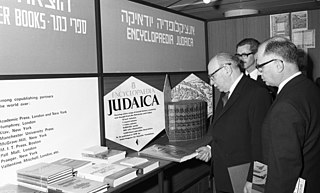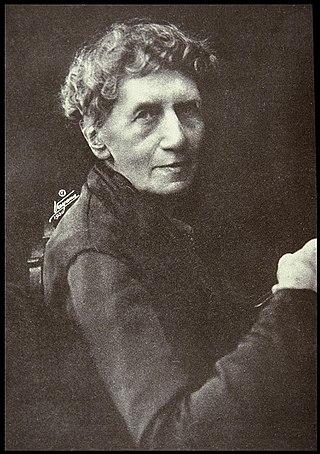
The Boston Public Library is a municipal public library system in Boston, Massachusetts, founded in 1848. The Boston Public Library is also Massachusetts' Library for the Commonwealth, meaning all adult residents of the state are entitled to borrowing and research privileges, and the library receives state funding. The Boston Public Library contains approximately 24 million items, making it the third-largest public library in the United States behind the federal Library of Congress and New York Public Library, which is also privately endowed. In 2014, the library held more than 10,000 programs, all free to the public, and lent 3.7 million materials.

The Encyclopaedia Judaica is a 22-volume English-language encyclopedia of the Jewish people, Judaism, and Israel. It covers diverse areas of the Jewish world and civilization, including Jewish history of all eras, culture, holidays, language, scripture, and religious teachings. First completed in 1971–1972, the encyclopedia had been published in two editions by 2010, accompanied by a few revisions.

Mary Antin was an American author and immigration rights activist. She is best known for her 1912 autobiography The Promised Land, an account of her emigration and subsequent Americanization.
Judy Yung was a historian and professor emerita in American Studies at the University of California, Santa Cruz. She specialized in oral history, women's history, and Asian American history. She died on December 14, 2020, in San Francisco, where she had returned in retirement.
Judith Hoffberg was a librarian, archivist, lecturer, a curator and art writer, and editor and publisher of Umbrella, a newsletter on artist's books, mail art, and Fluxus art.

Anne Carroll Moore was an American educator, writer and advocate for children's libraries.
Robert Singerman is a librarian, and a recognized Judaica bibliographer. He is often cited by Judaica rare book dealers. He holds the position of University Librarian, George A. Smathers Libraries, University of Florida, where he was the bibliographer for Jewish Studies, Anthropology, and Linguistics.
Jewish Book Month is an important annual event in both the North American Jewish community and the publishing world. It is sponsored by the Jewish Book Council. It is held annually in the month before the Chanukah gift-giving season. Book fairs are held in most major cities with Jewish communities, albeit not in New York, and feature lectures by visiting authors.

Charles Evans was an American librarian and bibliographer.

Caroline Maria Hewins was an American librarian.

Frederic Beecher Perkins was an American editor, writer, and librarian. He was a member of the Beecher family, a prominent 19th-century American religious family.
Isaac Edward Kiev was a librarian, a rabbi, and an expert on Hebrew and Judaic literature. For over 50 years, he was the head librarian of Hebrew Union College in New York City, as well as serving as a pulpit rabbi for the Congregation Habonim and as a chaplain at the tuberculosis sanitarium Seaview Hospital from 1927 to 1975.
The Boston Women's Heritage Trail is a series of walking tours in Boston, Massachusetts, leading past sites important to Boston women's history. The tours wind through several neighborhoods, including the Back Bay and Beacon Hill, commemorating women such as Abigail Adams, Amelia Earhart, and Phillis Wheatley. The guidebook includes seven walks and introduces more than 200 Boston women.

Ernestine Rose was a librarian at the New York Public Library responsible for the purchase and incorporation of the Arthur A. Schomburg collection.

Rose Finkelstein Norwood was an American labor organizer. During her long career she led labor campaigns for telephone operators, garment and jewelry workers, boiler makers, library staffers, teachers, sales clerks, and laundry workers. She was active in many labor and civil rights organizations, including the Boston Women's Trade Union League, the Women's International League for Peace and Freedom, and the National Association for the Advancement of Colored People. She was a vocal opponent of antisemitism, racism, and fascism, a lifelong supporter of women's rights and workers' education, and an advocate for the elderly.

Lina Frank Hecht was one of Boston's leading philanthropists. She founded several of the city's earliest settlement houses, most notably the Hebrew Industrial School for Girls. She was active in the Women's Educational and Industrial Union, supported the arts, and helped launch the careers of Mary Antin and Louis Brandeis. In 1908 she became the first female vice president of the Federated Jewish Charities.

George W. Forbes (1864-1927) was an American journalist who advocated for African-American civil rights in the late 19th and early 20th centuries. He is best known for co-founding the Boston Guardian, an African-American newspaper in which he and William Monroe Trotter published editorials excoriating Booker T. Washington for his accommodationist approach to race relations. He also founded and edited the Boston Courant, one of Boston's earliest black newspapers, and edited the A. M. E. Church Review, a national publication.

The Paul Revere Pottery was a woman-run American art pottery founded during the Progressive Era in Boston, Massachusetts in the United States. It emerged as a subgroup of the Saturday Evening Girls Club (S.E.G.). The library group was started and guided by Edith Guerrier, a librarian; her partner, Edith Brown, an artist; and Helen Osborne Storrow, the financial patron of the group. The Saturday Evening Girls Club was established in 1899, and located in Boston's North End. The group aimed to serve as an intellectual and social hub for young immigrant girls that otherwise had very few economic, educational, or social opportunities due to cultural differences. Paul Revere Pottery was established in the early twentieth century. The pottery gained national and international recognition.

The Saturday Evening Girls club (1899-1969) was a Progressive Era reading group for young immigrant women in Boston's North End. The club hosted educational discussions and lectures as well as social events, published a newspaper called the S. E. G. News, and operated the acclaimed Paul Revere Pottery. Financed by philanthropist Helen Storrow and run by librarian Edith Guerrier and her partner, artist Edith Brown, the club originated at the North Bennet Street Industrial School (NBSIS), a community charity building that provided educational opportunities and vocational training. Meetings were later held at the Library Club House at 18 Hull Street. Storrow also provided a house in Gloucester, Massachusetts, where club members could vacation in the summer.
Mollie Ernestine Dunlap was a librarian, bibliographer, and educator. Her research illuminated the scholarship of African Americans and the experience of African Americans in higher education, especially the groundbreaking publication of the Index to Selected Negro Publications Received in the Hallie Q. Brown Library. Her work as a founding member of the first African American library association, as well as within the American Library Association, championed the civil rights of black librarians in the United States.













